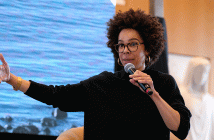Ethics are ethics, no matter where in the world a medical study is being conducted, according to an expert who spoke at Fordham about the complexities of carrying modern research practices across cultural boundaries.
It’s both possible and necessary to stay true to ethical standards—such as informed consent—while also respecting the culture of those who are participating in a medical study, said Ruth Macklin, Ph.D., head of the division of biomedical ethics at Albert Einstein College of Medicine and an international leader in HIV research ethics.
“Custom, culture and tradition cannot provide a justification for departing from ethical principles,” she said. “Culturally sensitive approaches … can show respect for cultures without violating fundamental ethical principles.”
She spoke on Aug. 1 at the Rose Hill campus, at a luncheon of the Center for Ethics Education. The center held a training institute from July 24 through Aug. 3 on the ethics of HIV prevention research.

Ruth Macklin, Ph.D., advocates the principle of “respect for persons” to be used by researchers conducting international medical trials. Photo by Ryan Brenizer
She described the problems that arise when global health research meets traditional belief systems that don’t mesh with modern science.
How, for instance, can people make an informed decision to take part in a vaccine trial if they don’t believe in microbes or the germ theory of disease? One solution is to present the information creatively, using analogies that the people taking part in the research can understand, she said.
She also noted the example of a group of researchers, including Americans, who were not going to tell their Vietnamese research subjects that the breast cancer study in which they were participating was randomized—that is, that only some of them would receive the treatment being tested.
They reasoned that the participants saw the researchers as doctors, who are supposed to give the correct treatment and not “flip a coin,” Macklin said; the researchers thought this element of uncertainty would make the participants lose faith in their doctors.
A U.S. institutional review board disagreed, however, saying “we have to adhere to … what are really universal standards,” not just U.S. standards, Macklin said. The Vietnamese doctors could be educated, she said.
She noted some counterarguments—for one, that “departures from widely accepted ethical standards are justified by the cultural context in the country or community where the research is carried out.” Some would argue that it would be impossible to carry out research in other countries otherwise, and that the people in those countries would therefore miss out on the benefits of the research, she said.
In response, she said, “There is a great deal of research that goes on today in Africa and in Asia that follows the kinds of universal ethical principles that we’ve come to accept, and that are issued by the World Health Organization” and other international bodies.
In talking with colleagues from other parts of the world, she has found that “respect for persons” is the overriding principle.
“When we’re talking about a global enterprise such as international research, whoever the sponsors are, we’re not imposing somebody’s cultural values on another,” she said. “These are the cultural values—or the international values, I should say—of the research enterprise.”


